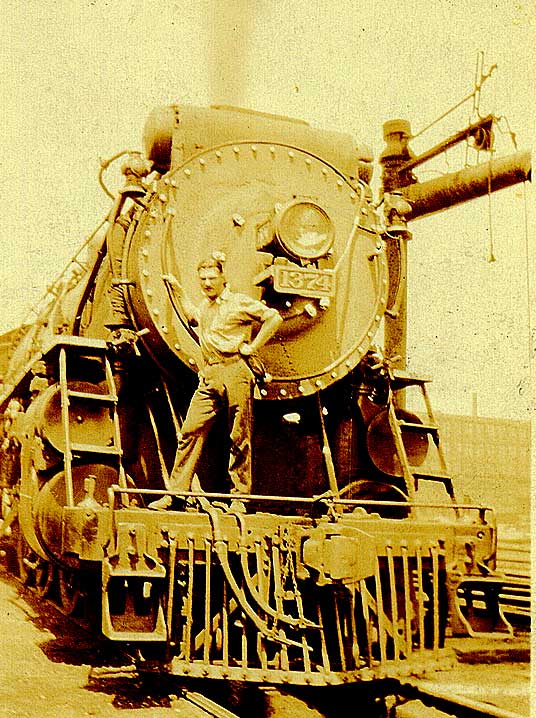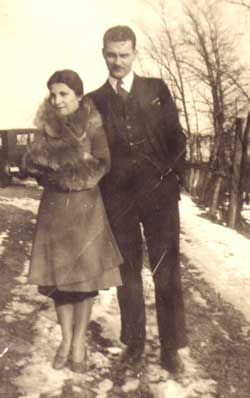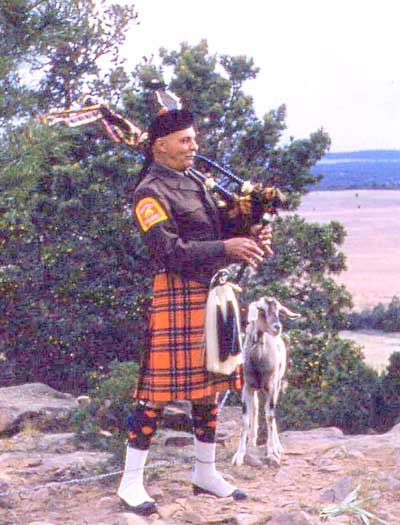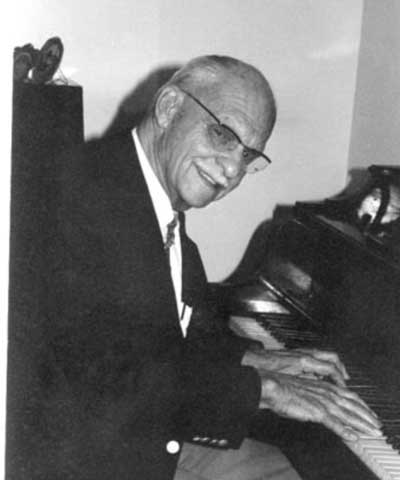Oh My Papa
Isabel Bearman Bucher
© Copyright 2014 by Isabel Bearman Bucher


Photo of George Fisk Miller. Properth of the author.
|
Ebony
and Ivory
Oh My Papa Isabel Bearman Bucher
© Copyright 2014 by Isabel Bearman Bucher
|
Photo of George Fisk Miller. Properth of the author. |
 Photo of Marie Bernadina Yvonne DeBernardi. Property of the author. |
My
Dad, George Miller, was the only
intermarriage in our very Italian family, émigrés
from
Northern Italy in 1914, for a long time. The first time he ever saw
Mamma, she was stepping out of a New Haven, Connecticut garage, where
she was the office manager, accountant and undisputed capo de capo
despite her 4'8" size. He hit the curb with his neat little
yellow 30's roadster, with the spare tire and rumble seat, because as
yet, he hadn’t gotten around to putting in brakes. George
stepped out, crossed the street and stood in front of Marie Bernadina
Yvonne DeBernardi. For the two of them, it was all over but the
wedding, which occurred some four years later ... AFTER she’d
directed him/pushed him to enroll in the Yale University Technical
School, when they had one, and paid for his drafting education. |
Fed-up with such a hum-drum life, Dad ran away from his New Haven home at 15, lied about his age and joined the Army. It was 1918, the tail end of World War I. He became part of a mule detail based at Camp Mead, Virginia. One blustery spring day, none other than 28 year-old Lieutenant Dwight D. Eisenhower was sitting in the grandstand waiting to review his troops. In the stable, our buck private, George Fisk, couldn’t get an old cantankerous mule, almost as tall at the stable ceiling, to back into a caisson wagon. The mule took off like a shot. Furious, George grabbed his tail and got dragged around the parade ground three times. When he was able to stop the cussed creature, he promptly socked him between the eyes, and the beast went down. The assembled enlistees, visiting gallery of whomevers and brass, agape at the felled ass, came to and cheered wildly. In tatters, George threw out his chiseled jaw, saluted, ripped uniform and all. With all due ceremony, he was later decorated by Lieutenant Eisenhower for bravery, determination and perseverance, traits he pounded into our heads on almost a daily basis, along with the story of the ass.
“Why didn’t you say you could play?” questioned the camp commandant a few days later, when he heard his famous tail-gripper at the piano, “I’ve got a much better job for you, Sonny Boy, than stable mucking and mule punching!”
The next day he was put into the
camp’s Army Band, got a
raise in rank and pay. George taught himself to play every band
instrument in matter of weeks. A month or so later, he and twenty other
band members were aboard a bus going on a good will trip to neighboring
towns, when it smashed through a railing and plunged into a somewhat
shallow, swampy southern river. It was April 17, 1918, his sixteenth
birthday. The reason for the dive, and also what saved the band, was
that the boys had loaded up on the local Virginia moonshine for
breakfast and were three-sheets-to-the-wind before 7 A.M. George waded
ashore pushing the bass drum. A powerful swimmer, he then returned and
rescued the disoriented and feckless fellowship, some of whom were too
drunk to even float, much less get out of the nosedived bus. The rest
of the day, the boys of the band, now sober as judges, stripped to
their underwear and engaged in ompah-pa instrument salvage. They dug
mud out of saxes, trombones, tubas and tooth brushed the brass section.
A couple of farmers showed up, hitched the bus to their compliant mule
teams and pulled it out of the river. Other residents, including a
zealot preacher praising God for this hung over flock, came to the
rescue. The town volunteers joined the band members, and helped re-oil,
re-polish and re-scrub everything in sight, while being assailed with a
fiery sermon regarding the demon drink. After declining the heartfelt
invitation to be baptized in the very drink from which they were
rescued, stating that Brother George Fisk had already done that, the
laundered band boys climbed aboard the bus. Twenty miles down the road,
they went on that night, as if nothing had happened. Their second set
of uniforms, miraculously dry and crisply folded, stayed in suitcases
tied atop the bus. Occasionally in the months that followed, a wind
instrument would plug up or give off some foreign squawk, but the bus
never showed one ill-effect from its swan dive.
| The code of silence
sworn by the moonshine river dunkers was never broken. Post Army, George, now a stunningly handsome six footer with jet hair, moustache and amber eyes, returned to New Haven, after a brief stint on the railroad. Gorgeous George, as he was now dubbed, formed a band, made plenty of moolah, as he put it, in an exciting and fly-by-night way. Many a night, playing at some fancy docking place on the East Coast, huge yachts would pull up, listen, come ashore to dance with their painted fluzies, share homemade moonshine and toss twenty dollar bills at Dad and company tooting on the dock. |
 Photo of George property of the author. |
Since my Nonna Angela had just concocted a “Little Still on the Hill” where she made her own Italian liquors, I understood his sermon.
Soon after, he landed a place in “Yalie,” Rudy Vallee’s band, because while playing around New Haven and surrounds, he’d been discovered. It was here Maire Yvonne entered the picture and made an honest nine-to-fiver out of our wild George. With her encouragement, and her financial help, he finished his schooling that took fours years, entering the Yale University Sheffield Technical School of Design to become a draftsman.
 George and Marie. Property of the author. |
In June of 1936, with a fine trade tucked under his belt, after a two week Lake Louise, Canadian honeymoon, he thus entered the tight knit male DeBernardi fellowship who tap-danced around the formidable, bright women, led by my Nonna Angela, the Queen Bee. George turned into "un bell’italiano!" He drank vino rosso, smoked curly pungent cigars with the rest of the DeBernardi males and their friends, learned to kiss other men, and cry over opera - IF it was Italian. He earned his living working first for the State of Connecticut, then the Sunbeam Corporation helping to design the first electric mixer. |
In the early 50's, when he’d signed onto go to Saudi Arabia to do pipeline drafting, Mamma read an ad in the Houston Chronicle. We’d moved there about eight years back, and it is a time that then, and even now, I consider the worst stretch of grief I ever endured.
“There’s an add in here for draftsman,” she said holding the paper at supper that night. “Sandia Corporation, Albuquerque. Atomic energy George!”
“They won’t take me,” responded Dad. “I’m too old.”
He was 49 at the time. Of course they took him, and of course we moved to Albuquerque, New Mexico. The moment David drove us over the mountain, and I saw the city spread before me, I knew I was home, at last.
Dad was quite brilliant at his work for the Atomic Energy Company, and never shared his projects. He and Mamma had the best years of their lives there. They joined a club for service people and for Sandia employees, where, every Friday night they went to “happy hour” joining friends, gabbing, laughing and dancing the night away. Some nights, dad took center stage, grabbed a musician’s instrument and played it like the pro he was. One fateful evening, he and his buddies got a snoot full and decided to have a community dip in the great club pool ... all of them stripped down to their jockey shorts. Mamma was a maniac, along with the rest of the wives, hoofing it around the pool’s perimeter - begging - to no avail. When she finally got Gorgeous George out of the drink, she drove him home and pushed him face down in the guest bedroom bed. That next morning when he woke, still in his soggy shorts, he had only a dim recollection on the past night’s antics - except he couldn’t find his false teeth.
He drove back to the pool, and there, found a little kid playing with them.
Needless to say, that never happened
again.
|
Soon after, he began the first Shrine bagpipe band in the US, tooting and squeezing that bag until he got it. So, after so many years, Gorgeous George, dressed in a Royal Stewart kilt, and walked proudly in all parades with his buds, now musicians of the bag squeezing kind. The first time I ever heard them all marching down Central Avenue in Albuquerque, I was cheering so loud, I lost my voice, and I understood Scotland the Brave. Truly. Who could face THEM? Mamma became wheelchair bound in 1968. A too late operation couldn’t fix the cervical spur that had invaded her spinal column. For sixteen years, he never left her side, and she was no piece of cake, let me tell you. In 1984, at 78, Mamma passed away and there began a new life for Gorgeous George, now 82, now |
 George playing bagpipes. Property of the author. |
 George. Property of the author. |
My youngest still wears parts of that
tux in his honor and has his
pipes. She is a musician herself, who sings, composes music and plays
many instruments. My eldest is a math whizz, and high heel lover like
her Gram Marie. And nights, when I’m alone, I sit at the old ebony and ivory Baldwin Acrosonic piano, listen to the chimer clock, and sing the old songs he taught me. I think back on so much in my life, I think of my Pops with complete and total love. He was a man among men, built of principle and honor; he was a ribald voice full of humor and tricks; he was an intellect, a seeker of knowledge. He was and is the best man I ever knew. |
Isabel's Story List and Biography